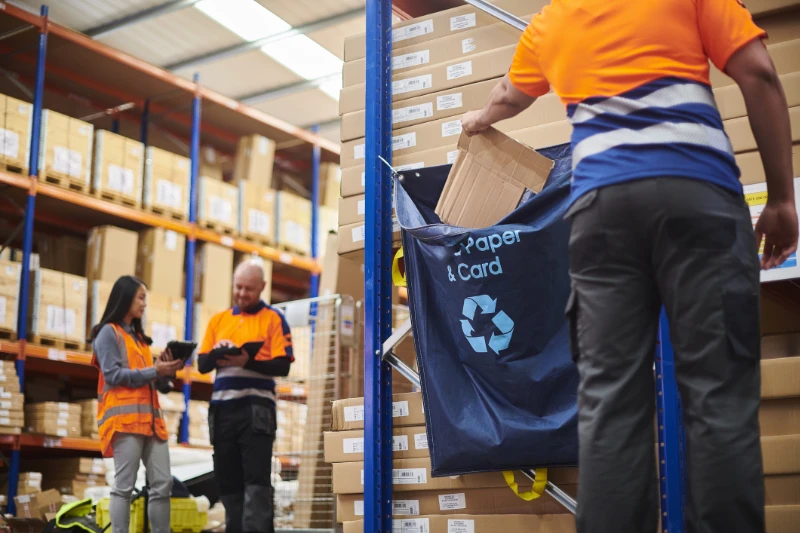How to reduce waste in your warehouse

Reducing waste in your warehouse offers numerous benefits, including cost savings, operational efficiency and environmental sustainability. By implementing effective waste reduction strategies, businesses can minimise their environmental impact, enhance their reputation and contribute to a more sustainable future.
Not only does reducing waste and implementing sustainable practices save you space, time, and money, but it also strengthens the overall competitiveness of your warehouse in your industry and can improve your business reputation.
It is important, now more than ever, for warehouses and workplaces to actively work to reduce the number of raw materials used in operations and eliminate waste.
Thankfully, there are a number of proactive steps warehouses can take in waste reduction. This blog will provide you with practical tips and strategies on how you can reduce waste in your warehouse and implement sustainable waste management systems to reduce your environmental impact.
1. Implement recycling programmes
Establishing a robust recycling program is fundamental to reducing warehouse waste. By diverting recyclable materials from landfills, businesses can conserve resources, reduce costs and demonstrate a commitment to environmental responsibility.
Implementing clear guidelines for waste segregation, providing appropriate recycling bins and educating employees about recycling practices are essential for program success.
Recycling and reusing are two of the most effective ways of saving and preserving the earth’s natural resources. By implementing and using a recycling programme, your warehouse helps to sustain the environment for future generations, saves energy, saves money, and reduces gas emissions that contribute to climate change.
2. Optimise packaging and shipping practices
Efficient packaging and shipping practices can significantly reduce waste. By using minimal packaging materials and ensuring that products are packed securely and efficiently, businesses can minimise the amount of waste generated.
Additionally, you can choose to use biodegradable, recycled, or recyclable materials to optimise packaging that can be used again or disposed of sustainably.
3. Promote employee awareness
Employee awareness ensures that all workers in your warehouse are familiar with sustainability policies implemented to reduce waste. Engaging employees in waste reduction efforts is crucial for long-term success. By promoting a culture of sustainability, businesses can empower employees to identify waste reduction opportunities and implement practical solutions.
This can be achieved through workshops and training to provide information about the benefits of reducing waste and the processes your warehouse has introduced to do so. Explaining how to prevent waste and recycle materials correctly lets employees know how they are expected to handle and manage resources at work to contribute to waste reduction programmes.
4. Avoid carrying excess inventory
Excess inventory can lead to increased waste, storage costs, and the risk of product obsolescence. Additionally, excess inventory requires storage capacity and can build up high holding costs for your warehouse.
Slow-moving inventory that can not be sold is often due to poor inventory management. Implementing effective inventory management strategies, such as demand forecasting, just-in-time inventory, and regular stock reviews, can help optimise inventory levels and reduce waste. By minimising overstocking and understocking, businesses can also reduce the need for excessive packaging and transportation.
5. Stop waste at its source
Your warehouse can also stop waste at its source to cut down on gas emissions and save natural resources. Stopping waste at its source is the process of eliminating waste before it is created. This can be achieved by only buying the materials and products you need, using the materials and products that you purchase, and where possible, purchasing items that are long-lasting and can be reused.
By carefully selecting suppliers, purchasing materials in appropriate quantities and implementing lean manufacturing principles, businesses can minimise waste generation. Additionally, exploring opportunities to reuse or repurpose materials within the warehouse can further reduce waste and resource consumption.
Consider encouraging employees to use reusable bottles, bags, packaging, and food containers for their personal belongings too.
How Optima can help.
Optima offers a unique Consumables module which allows businesses to keep track of all the extras such as packaging, bubble wrap, void fill and more. This module is configurable on a customer by customer basis allowing tracking of generic and own branded material. Utilising this module will help combat material waste within the warehouse. Couple Optima’s Consumable Module with our vast reporting tools, you will have complete visibility and be able to track usage of all consumables over any given date range
With excellent knowledge of the complexities of today’s busy warehousing environment we have developed an easy-to-use, yet powerful Warehouse Management Software package, that will make your warehouse more efficient and rapidly move you towards reducing waste.

